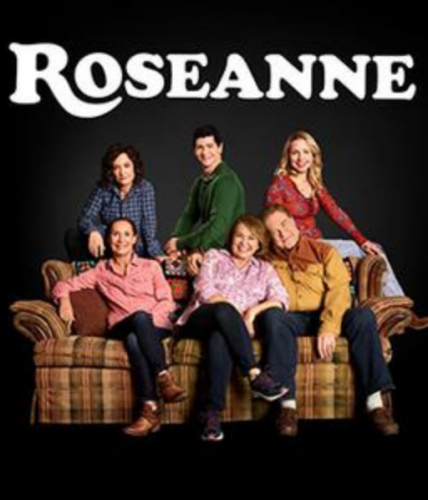Roseanne Barr is no stranger to controversy. She’s upset people on all parts of the political landscape, though more recently she’s leaned toward conspiracy theories and racism. And so, U.S. liberals didn’t enjoy the return of Roseanne – the TV show – for a 10th season in 2018. And by the end of that season, the show booted Barr and the network renamed it The Conners.
I recently watched Season 10 – along with a selection of episodes from the first nine seasons. My sense is that most of the show’s critics either didn’t watch it or didn’t get it. Many American liberals and progressives want their TV shows to practice prefigurative politics – they want TV to reflect their ideal visions of the world. In some rare cases, as with liberals and The West Wing, this degenerates into complete fantasy politics.
Roseanne never did that, and it certainly didn’t do that in Season 10. The show engaged with the world as it is, with the world’s biases, prejudices, and bad systems. And it often criticized those biases, prejudices, and systems in helpful ways.
Working-Class Success and Failure
More than anything, the original show’s 9-season run highlighted working-class success in the face of adversity. Roseanne left her job at Wellman Plastics at the end of Season 1. She maintained her dignity in doing so. And then she floated from job to job for a few seasons. She found many…mixed results: good co-workers at jobs without dignity, good schedules without good pay, bad schedules with good pay, and so on. She worked her way toward eventual success as a diner owner.
Dan’s path was different in its details but similar in its main themes. He did drywall work, and then he clawed his way toward success as a small business owner. Dan opened a bike job, and when he failed he became a construction manager. For both Dan and Roseanne, we see a common theme of trying to establish ownership and control in the workplace.
By Season 10, we move forward two decades and find little but working-class failure. They’re not succeeding, nor are they even moving in the right direction. Dan has come full circle and moved back to where he began his career. And Roseanne is driving for Uber. Both Conner daughters – Becky and Darlene – followed difficult marriages with life crises. And Conner son D.J. joined the military and now deals with trauma related to his deployment.
Roseanne Conner’s Politics
Quite a few critics of Season 10 complained about the show’s presentation of the character Roseanne Conner as a Trump supporter. Why? In the original 9-season run she was quite ‘progressive‘: she was consistently anti-racist, defended the rights of women, strongly supported unions, et al. How could she now back Trump?
I think most people who asks questions like this come from the professional classes. The hyper-partisan vision of politics we see in the U.S. press – where everyone is either a ‘Vote Blue No Matter Who’ Democrat or right-wing Republican – is just the way professional class people are and how they see politics. It doesn’t match most Americans’ perspective. Especially working-class Americans.
In my own extended family, I find: right-wing Christians who support a $15 minimum wage, racist New Deal Democrats, pro-business moderate Republicans, full Trumpists, and, of course, some liberal Democrats. Even the original Roseanne Conner character was never really a partisan Democrat. She held progressive attitudes, but she also hated politicians of any kind.
Life is complicated. And the truth is that working-class people, on average, are more complicated than wealthier people. As black people, on average, are more complicated than white people. There’s plenty to complain about in the politics of the TV show (and the person) Roseanne. But Barr always portrayed these complications really well. She did so once again in Season 10. Many of her liberal critics – from standard Democrats to progressive Warrenistas – don’t get this because they fully imbibe the narrow worldview of the U.S. press. And they continue living in the liberal bubble, largely unaware of the rest of the world.
Becky and Darlene Conner
Here’s what I found the most striking about Season 10: the development of the Becky and Darlene characters. In the 20 years since Season 9, neither succeeded in career or marriage. Becky developed a drinking problem and moved back to Lanford to take low-wage work. Darlene separated from her husband, got laid off from her job, and moved back in with Roseanne and Dan with two kids in tow.
It’s a tough world for both of them. But both reflect quite well the options of the working-class late Gen Xer or early Millennial. Each one is smart and skilled. Each one would’ve easily held down a full-time job three or four decades ago. In that transition, the world changed for younger working-class people in novel ways.
Roseanne Barr’s Politics
Finally, some people criticized the show solely because of the personal politics of its creator. For those who can bear it, I’d recommend to them they consider watching the show anyway. I don’t really get much of a sense of the ‘problematic’ Roseanne Barr in this show. Are there issues? Yes. But the broader intention of the show – to portrays the struggles of somewhat realistic working-class people in humane ways – is a good one.
Other people simply can’t separate the work from the creator, and so they refuse to watch Roseanne on the grounds that Barr herself is a problem. And that’s fine with me. If people want to take that stance, I’ve got no beef with them for taking it. But I don’t take that stance. I have little problem separating the work from its creator. I’ve never really had a problem performing that separation.
